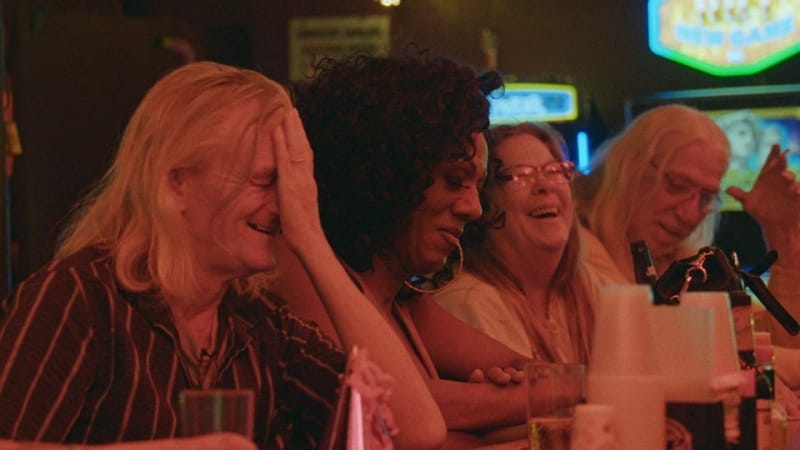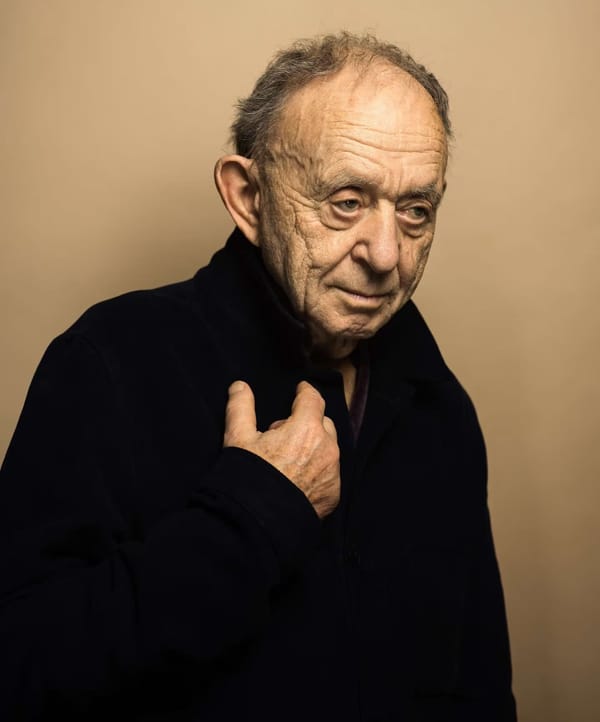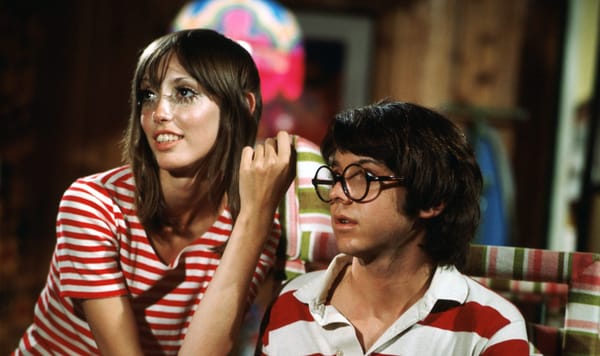One Good Film: "Bloody Nose, Empty Pockets" (+ new to VOD)
The Ross brothers's 2020 ode to a Las Vegas dive's last stand is warm, funky and trickier than it seems.

But first: New theatrical releases arriving on VOD this week, in order of ⭐s, starting with one of the year's best, and, yes, I'm re-pubbing my WaPo review in full because the movie's so damn good. (Skip down past the paywall if you want to get to the One Good Film.)
Some movies come along at exactly the moment they’re needed. In the opening minutes of “One Battle After Another” (⭐ ⭐ ⭐ ⭐, $19.99 premium rental on Fandango at Home; for sale at Amazon; still in theaters), Paul Thomas Anderson’s epic marvel of serious entertainment, a strike team of radical activists descends on a border detainment facility by night. They corral the soldiers on duty into a cage at gunpoint, cut the chains holding the gates closed and herd more than 100 men, women and children into a waiting truck to be whisked off to a sanctuary city. The most ferocious member of the crew is a striking Black woman; her White boyfriend is the demolitions expert charged with setting off diversionary explosions. “Snap, crackle, pop, baby,” she tells him by way of getting the show started.
Whether or not you agree with the tactics of French 75 — the revolutionaries have named themselves after a cocktail named after a World War I field gun — it’s bracing to see an overt act of resistance at this particular juncture in American history. And Anderson is just getting going. “One Battle After Another” isn’t really a political film, but neither is it not a political film. It just carries its concerns within the framework of a hellacious action movie, a sidesplitting character comedy, a riveting suspense thriller and various other genres the director makes up as he goes along, replete with a hapless hero, a warrior princess and the damnedest villain the movies have seen in a very long time.
That ferocious activist is named Perfidia Beverly Hills (Teyana Taylor), and she’s high on sticking it to the Man; her boyfriend, Pat (Leonardo DiCaprio), is comparatively mild-mannered, if equally committed to the cause. During the strike on the border facility, Perfidia comes up against the officer in charge, Steven J. Lockjaw, who will become Pat’s archnemesis and who is played by Sean Penn in one of that changeling actor’s most outrageous performances. “One Battle After Another” is a crowded and busy canvas of a movie, but Pat and Lockjaw become its stoner yin and ramrod yang, tussling over a third character who doesn’t even show up until a third of the way in.
That would be Charlene (Chase Infiniti), Perfidia and Pat’s daughter, raised by Pat for most of the 16 years since members of French 75 were jailed, killed or co-opted, and after Perfidia went AWOL. She wasn’t the mothering type, anyway.
In DiCaprio’s generously funny portrayal, Pat has proved to be a conscientious father and caregiver, despite a growing reliance on weed, booze and repeated viewings of Gillo Pontecorvo’s “The Battle of Algiers.” Charlene — renamed “Willa” in their new life, just as Pat has become “Bob” — is a badass-in-waiting of truth, beauty and grace. Infiniti, who played a major character in Apple TV+’s “Presumed Innocent,” arrives in this movie with the kind of star charisma that immediately holds the screen and that comes naturally or not at all.

“One Battle After Another” kicks into second gear when Lockjaw — now a colonel and in charge of rounding up the citizens that a character high up in the U.S. government calls “dangerous lunatics, haters and punk trash” — decides to tie off that loose end from years before. Playing a man who is surely the antithesis of everything the actor believes in, Penn has a blast, moving through scenes with a bandy-legged strut and a gleefully hypocritical lust when it comes to relationships between the races. One of the many wild detours in this dystopian diorama of a movie is the existence of the Christmas Adventurers Club, a shadowy organization for rich old men intent on keeping America as racially pure as Santa Claus himself.
Anderson wrote the screenplay for “One Battle After Another” apparently after steeping for years in Thomas Pynchon’s 1990 novel “Vineland,” and while the movie has only a tangential relationship to the book, it shares Pynchon’s sideways humor, deep paranoia, love of bananas character names and a sense that America is a comic strip forever on the verge of becoming a nightmare. “Battle” carves itself up into set pieces delivered with the imagination, flair and filmmaking chops that make Anderson (“There Will Be Blood,” “Phantom Thread”) one of our most gifted and idiosyncratic visionaries. (If you want to say “best,” be my guest.)
The movie’s central panel is Lockjaw’s assault on the fictional sanctuary city of Baktan Cross, a bravura sequence that sees soldiers in the streets, protesters on the roofs, the innocent in hiding and Pat separated from his daughter while desperately trying to get his fried brain to remember the passwords that would enable him to reach his old friends in the revolutionary underground. If that last development gets overplayed into tedious farce — backed by Jonny Greenwood’s eclectic score, so gorgeous in other scenes and so intentionally irritating here — the Baktan Cross scenes are rescued by an exuberant Benicio Del Toro as Sergio St. Carlos, Willa’s karate instructor and a man with an escape plan for every contingency.

Other characters crisscrossing the screen include Regina Hall as the most tenderhearted of the surviving French 75 crew; Tony Goldwyn as a pleasantly evil government functionary named Virgil Throckmorton; Kevin Tighe, almost touching as a sweetly senile racist; Eric Schweig as a bounty hunter with a moral compass; and April Grace as the Mother Superior of a desert convent called the Sisters of the Brave Beaver. At times, “One Battle After Another” feels like an R. Crumb comic that’s burst into vibrant, uncontainable life.
Yet Anderson is enough of a storyteller to end the film with a tremendous high-speed chase scene, the camera diving down and roller-coasting up a ribbon of desert highway on its way to a settling of scores that, among other things, marks a young woman’s coming of age. He’s enough of a nostalgist to indulge himself in precision needle drops (Steely Dan’s “Dirty Work,” Tom Petty’s “American Girl” and of course Gil Scott-Heron’s “The Revolution Will Not Be Televised”).
And he’s enough of an optimist to suggest that a fresh generation is ready, willing and more than able to pick up the gauntlet of resistance laid down by elders who have grown weak and weary of the fight. That’s the real drama of this movie — that the fight’s just beginning, and also that it never ended. That this is what it takes to truly be free in America and what it has taken for all of our 250 years: one battle after another. Snap, crackle, pop, baby.
"Nouvelle Vague" (⭐ ⭐ ⭐, streaming on Netflix and in theaters) is a B&W Academy-ratio mash note to the French New Wave, Jean-luc Godard and the making of “Breathless” (1960). The cast is mostly French and mostly unfamiliar except for Zoey Deutch playing Jean Seberg (and very well, if with too much spirit and not enough anomie), and Guillaume Marbeck is scary-good as Godard, never once removing his sunglasses and speaking in unbearably pretentious, unbearably brilliant poetic-aphoristic boilerplate. ("Art and crime both require leisure time to flourish"; "Reality is not continuity.") Aubry Dulin is a grinning ringer for the young Jean-Paul Belmondo (but, again, minus the sense of threat), and, look, there’s the young Francois Truffaut (Adrien Rouyard) and Claude Chabrol (Antoine Besson) and Jacques Rivette (Jonas Marmy) and Raoul Coutard (Matthieu Penchinat) and, and, and … Linklater throws name after name at us, not expecting us to remember them all but simply to marvel at the crowd and the ferment that was somehow responsible for this most spontaneous of cinematic gestures, a bomb of anti-filmmaking filmmaking that changed everything that came after it.
Coming complete with fake reel-change marks (and cigarettes – so many cigarettes), “Nouvelle Vague” is the nichiest of niche projects, made with love and not a care for profit, and it’s a precise encapsulation of Linklater's strengths and limitations as a director, in that it takes a grand and unique concept (like, say, three decades-apart movies about one love affair or one decades-spanning movie about a boy growing up) and is content to meet the challenge without saying anything of greater import. Does a work of inspired fan-fiction like “Nouvelle Vague” actually mean anything? No, but it doesn’t really have to. That said, a revisit (or a first visit) to "Breathless" itself (⭐ ⭐ ⭐ ⭐, streaming on HBO/Max, Kanopy and the Criterion Channel; renting for $3.99 on Amazon and Apple TV) serves as a fresh slap in the face while revealing Linklater's film as the genial palimpsest it is.
"Kiss of the Spider Woman" (⭐ ⭐ ⭐, $14.99 premium rental at Amazon, Apple TV and Fandango at Home). Better than you’d expect: a lavish filming of the 1992 Kander and Ebb stage musical that was based on the 1985 movie that was based on Manuel Puig’s 1976 novel. After all that titration, the plot still holds: A prison cell in 1975 Argentina, where political prisoner Valentín Arregui (Diego Luna) is thrown together with Luis Molina (Tonatiuh), a gay man arrested for public indecency. The latter regales the former with the remembered plot of a fictional Hollywood B-movie (see title) starring the fictional Aurora (Jennifer Lopez), which director Bill Condon (“Gods and Monsters,” “Kinsey,” “Dreamgirls”) stages as a series of homages to classic Hollywood musicals, from Astaire and Rogers to Gene Kelly and MGM’s Freed unit to Howard Hawks’ “Gentlemen Prefer Blondes” to Bob Fosse and “Cabaret,” all with a dash of Maria Montez in 1944’s “Cobra Woman.” The movie’s greatest weakness (aside from the built-in cognitive dissonance of subject and style) is JLo, who gets the steps and the singing right but has little of the spirit of Chita Rivera in the original staging or mystique of Sonia Braga in the first movie; its greatest strength is Tonatiuh (TV’s “Vida”), who walks the line of camp and tragedy with self-aware wit, and who can sing and dance like a pro. See it for them, and by "them" I mean Tonatiuh.
“Roofman” (⭐ ⭐ 1/2, $19.99 premium rental at Amazon, Apple TV and Fandango at Home) casts Channing Tatum as real-life goofball felon Jeffrey Manchester, who robbed McDonalds restaurants by breaking through their roofs, then went to prison, then escaped from prison and lived undetected for the better part of a year in a Toys R Us store while romancing a local church lady (Kirsten Dunst). Tatum is charming, Dunst is charming, the supporting cast (including Ben Mendelsohn and Uzo Aduba as a pastor and his wife and Peter Dinklage as a prissy/pissy store manager) is charming, and the movie, at two hours and six minutes, overstays its welcome by about half an hour. Director Derek Cianfrance, who co-wrote the screenplay with Kirt Gunn, is known for the bruising love/hate story “Blue Valentine” (2010) and the heavyweight multi-generational melodrama “The Place Beyond the Pines” (2012); this is his first comedy, and it shows. It’s best for the quiet scenes between the leads, in which Dunst knows exactly what to do and shows her co-star the way.
If you're looking for something lightweight, "Good Fortune" (⭐ ⭐ 1/2, $19.99 premium rental at Amazon, Apple TV and Fandango at Home) is a comic variation on “Wings of Desire” and “It’s a Wonderful Life” with a core of class anger that would be more convincing if it didn't come from rich Hollywood stars. It also would be a much lesser film without Keanu Reeves as a low-level guardian angel named Gabriel, haplessly trying to help the despairing, debt-laden Arj (writer-director Aziz Ansari). It’s the funniest role Reeves has had in a while – think Bruno Ganz in “Wings” crossed with Ted “Theodore” Logan at his most earnest – and it rises to delightfully absurd heights when Gabriel loses his budget-seraph status and has to live among humans, washing dishes at a taqueria and smoking like a fiend. The rest of the movie has Arj switching places with a whinnying bro of a venture capitalist played by Seth Rogen, and it’s amusing enough and more than a bit obvious, but “Good Fortune” rests on the universal fondness with which we hold its leading angel, who has the rare knack of being in on the joke while somehow remaining too pure for it.
Okay, on to the sleeper recommendation:





